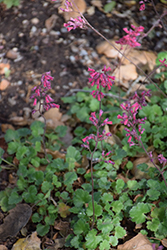It's all about ...
plants

Canyon Pink Coral Bells
Heuchera 'Canyon Pink'
Plant Height: 4 inches
Flower Height: 12 inches
Spacing: 18 inches
Sunlight:
![]()
![]()
Hardiness Zone: 8a
Other Names: Coralbells, Alumroot
Group/Class: Canyon Series
Description:
Rose pink bells rise from compact mounds of gray-green mottled foliage; plant in light shade with regular summer water; tolerates coastal full sun; great for beds, edging, or containers; keep soil moist in the heat of summer
Ornamental Features
Canyon Pink Coral Bells has masses of beautiful spikes of rose bell-shaped flowers with white eyes rising above the foliage from mid spring to mid summer, which are most effective when planted in groupings. Its attractive crinkled lobed leaves emerge light green in spring, turning grayish green in colour the rest of the year. The dark red stems can be quite attractive.
Landscape Attributes
Canyon Pink Coral Bells is a dense herbaceous evergreen perennial with tall flower stalks held atop a low mound of foliage. Its medium texture blends into the garden, but can always be balanced by a couple of finer or coarser plants for an effective composition.
This is a relatively low maintenance plant, and should be cut back in late fall in preparation for winter. It is a good choice for attracting hummingbirds to your yard. It has no significant negative characteristics.
Canyon Pink Coral Bells is recommended for the following landscape applications;
- Mass Planting
- Rock/Alpine Gardens
- Border Edging
- General Garden Use
- Groundcover
- Container Planting
Planting & Growing
Canyon Pink Coral Bells will grow to be only 4 inches tall at maturity extending to 12 inches tall with the flowers, with a spread of 24 inches. When grown in masses or used as a bedding plant, individual plants should be spaced approximately 18 inches apart. Its foliage tends to remain low and dense right to the ground. It grows at a medium rate, and under ideal conditions can be expected to live for approximately 10 years. As an evegreen perennial, this plant will typically keep its form and foliage year-round.
This plant does best in partial shade to shade. It prefers to grow in average to moist conditions, and shouldn't be allowed to dry out. This plant should not require much in the way of fertilizing once established, although it may appreciate a shot of general-purpose fertilizer from time to time early in the growing season. It is not particular as to soil type or pH. It is somewhat tolerant of urban pollution. Consider covering it with a thick layer of mulch in winter to protect it in exposed locations or colder microclimates. This particular variety is an interspecific hybrid. It can be propagated by division; however, as a cultivated variety, be aware that it may be subject to certain restrictions or prohibitions on propagation.
Canyon Pink Coral Bells is a fine choice for the garden, but it is also a good selection for planting in outdoor pots and containers. It is often used as a 'filler' in the 'spiller-thriller-filler' container combination, providing a mass of flowers and foliage against which the larger thriller plants stand out. Note that when growing plants in outdoor containers and baskets, they may require more frequent waterings than they would in the yard or garden. Be aware that in our climate, most plants cannot be expected to survive the winter if left in containers outdoors, and this plant is no exception. Contact our experts for more information on how to protect it over the winter months.
This plant is not reliably hardy in our region, and certain restrictions may apply; contact the store for more information.
